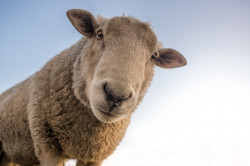Worried about indoor air quality? Breathe easy with ECO-SEE enhanced sheep's wool insulation
Air pollution has been in the news a lot recently, with the UK and France announcing future bans on petrol and diesel cars in an attempt to ensure clean air for their citizens. Less widely reported however is the risks associated with indoor air pollution. This is despite the fact indoor air is on average 2-5 times more polluted than outdoor air. One solution could come in the form of eco-building materials that utilise natural substances known to have a positive impact on indoor air quality. Sheep’s wool is a particularly interesting material. Research has previously shown its capacity to absorb certain harmful gases such as VOCs (volatile organic compounds - irritant chemicals from new furniture, air fresheners and household cleaning products). These substances are linked to headaches, eye and skin irritation and respiratory problems. Sheep’s wool is already sold as a high quality, eco-friendly insulation material by companies like Black Mountain Insulation (BMI), a leading UK based manufacturer of natural insulation products. In order to learn more about the VOC absorption properties of wool, BMI teamed up with researchers at Bangor University’s BioComposites Centre in the framework of the EU funded ECO-SEE project. The partners aimed to find ways to increase the wool’s VOC capture capabilities, with a view to developing a new and novel product prototype. Increasing performance by 100% The team in Bangor analysed different wool samples, showing that the amount and type of VOCs absorbed by wool were dependent on the sheep breed and the processing of the wool. They then tested a range of possible wool modifications and treatments, including mechanical, chemical, additive and energetic/irradiation methods. According to Dr Graham Ormondroyd from Bangor University the results were very positive. “We found a lot of potential in chemical modifications and additives. Our research showed that the addition of certain natural polymers can increase the ability of sheep’s wool to absorb VOCs by over 100%.” Based on the research conducted in Bangor a prototype sheep’s wool insulation was developed using the most promising treatment. Gordon Pirret, Chairman of Black Mountain Insulation, is excited by the potential. “We already knew that sheep’s wool is a high performing insulation material with some fantastic characteristics, but the work carried out in ECO-SEE has now demonstrated the accompanying health benefits. What we have learned will be invaluable in order to communicate this to potential customers, and opens up new avenues for product development.” Health and energy efficiency benefits The prototype product has subsequently been demonstrated at full scale at the ECO-SEE test sites in the UK and Spain. These demonstrations showed the potential benefits of using different eco-materials together – the insulation was incorporated into a novel wall panel system, together with other ECO-SEE innovations (low VOC panels, and hygrothermal coatings). The results were impressive, also in terms of energy efficiency. Compared to the reference walls using standard insulation and finishing materials, the panels achieved: - 50% improvement in energy performance - 20% reduction in embodied energy - 20% improvement in material performance. As we spend up to 90% of our time indoors, solutions to improve indoor air quality are being sought with increasing urgency. ECO-SEE has shown that eco-materials such as enhanced sheep’s wool insulation can be an environmentally sensitive solution to the problem. Find out more about the ECO-SEE eco-materials at: www.eco-see.eu You can find out more about BMI’s natural insulation products at: www.blackmountaininsulation.com Read more about Bangor University’s research into sheep’s wool at: http://research.bangor.ac.uk/portal/en/publications/searchall.html?searchall=Wool%20insulation.
Keywords
indoor air quality, eco-materials, green building, energy efficiency, insulation, VOCs, health
Countries
Belgium, Germany, Spain, France, India, Italy, Poland, Portugal, United Kingdom



